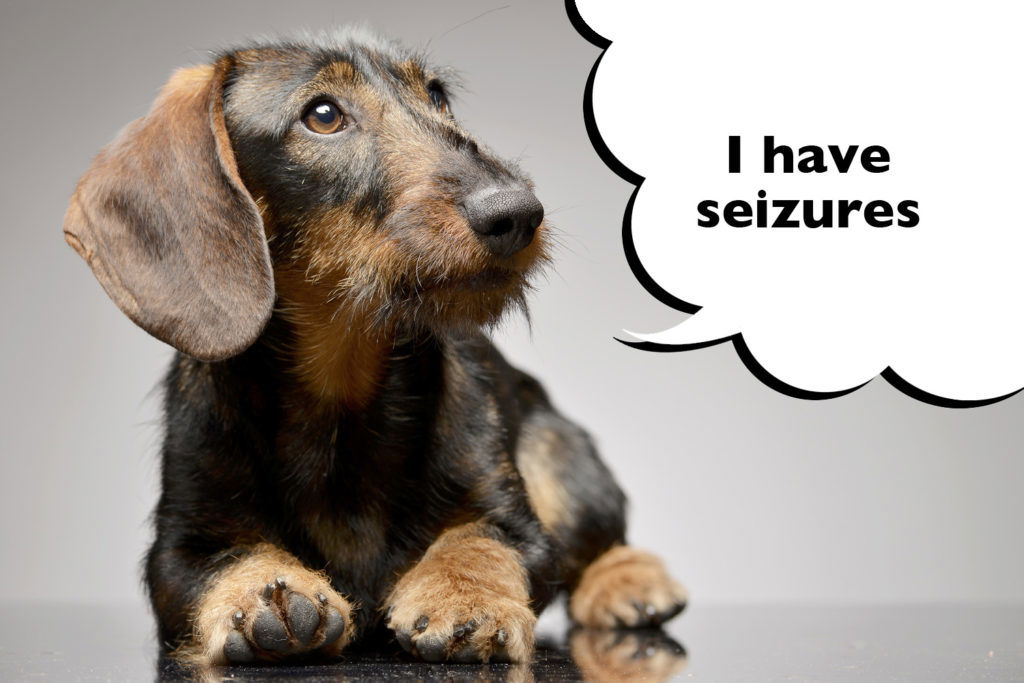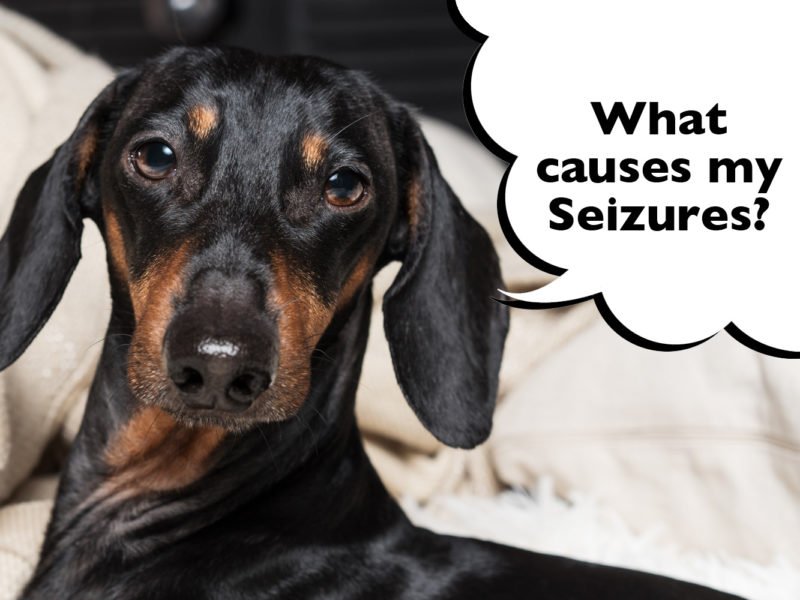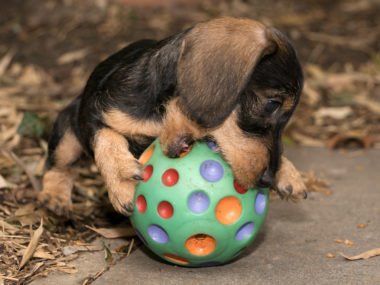Has your Dachshund recently had a seizure? Are you trying to find out more about the causes of seizures and what you can do to help? Here’s everything you need to know about what Causes seizures in Dachshunds.
What Causes Seizures in Dachshunds? Some of the most common causes of seizures in Dachshunds are:
- Epilepsy
- Low blood sugar or diabetes
- Lafora disease
- Heart disease
- Brain tumour
- Sleep deprivation
- Dehydration
- Eating something toxic
There are a number of causes for seizures in Dachshunds. It’s quite often down to genetics (your Dachshund has inherited a gene that makes him prone to seizures), but seizures can also be triggered by health issues and environmental or lifestyle factors.
Read on to find out what a seizure is, how common they are, what the signs and symptoms of a seizure are, how long they last and what to do if your Dachshund is having one.
Table of Contents
- What Is A Seizure In A Dachshund?
- Are Seizures Common In Dachshunds?
- When Are Dachshunds Most Likely To Have Their First Seizure?
- When Do Dachshunds get Diagnosed With Epilepsy?
- How Do I Know If My Dachshund Is Having A Seizure?
- How Long Do Seizures Last In Dachshunds?
- Are Seizures Harmful To Dachshunds?
- What Do I Do If My Dachshund Is Having A Seizure?
- Can I Reduce My Dachshund’s Risk Of Having A Seizure?
- What Is Lafora Disease In Dachshunds?
- What do I do next?
This article is based on research and personal experience as a Dachshund owner of 10+ years. I’m not a Vet, qualified dog trainer or dog behaviourist. If your Dachshund has had a seizure or you’re concerned about their health, it’s important to contact your Vet for advice.
What Is A Seizure In A Dachshund?
A seizure is sudden electrical activity in your Dachshund’s brain that temporarily stops it working properly.
During a seizure, your Dachshund is awake but unconscious. His body is awake but his brain has temporarily switched off.
As the seizure takes hold, your Dachshund’s body will react by going stiff, jerky or floppy, but he will not be able to hear you or respond to you.
If this happens to your Dachshund, contact your vet for advice.
Are Seizures Common In Dachshunds?
Sadly, seizures are relatively common in Dachshunds compared with other dog breeds.
Miniature wire-haired Dachshunds and those with the dapple gene are particularly prone to seizures.
When Are Dachshunds Most Likely To Have Their First Seizure?
Dachshunds that are going to suffer from seizures can have their first anywhere between 6 months and 5 years of age. But some diseases can cause seizures from 5 years onwards.
Some Dachshunds will suffer with recurring seizures throughout their lives (due to epilepsy or a health issue), and others may have one or two isolated episodes that don’t seem to affect their health one bit.
And of course many Dachshunds don’t suffer with seizures at all.
When Do Dachshunds get Diagnosed With Epilepsy?
If your Dachshund has two or more seizures with no obvious cause, they’ll probably be diagnosed with epilepsy.
If your Dachshund has a seizure, always contact your vet for advice.

How Do I Know If My Dachshund Is Having A Seizure?
Sometimes your Dachshund will act differently before having a seizure. For example, his mood might change, he might start drooling, licking or pacing, or he may become snappy or aggressive.
If you spot any of these signs, keep calm and focus on making the environment safe for your Dachshund so that, if he does have a seizure, he doesn’t hurt himself.
If your Dachshund is having a seizure, he might:
- Go stiff
- Jerk and convulse (he might look like he’s running)
- Fall to the floor
- Look like his eyes have glazed over
- Clamp his mouth shut
- Wee or poo
- Wobble on his feet (if he’s still standing)
- Drool or foam at the mouth
- Look dead
- Not be able to respond to you
Always contact your vet if your Dachshund does have a seizure and follow their advice on what to do.
How Long Do Seizures Last In Dachshunds?
Seizures in Dachshunds can last anywhere between 5 minutes and 15 minutes. If your Dachshund doesn’t recover after 15 minutes or seems to be having seizure after seizure, contact an emergency vet for advice.
Always contact your vet if your Dachshund is having a seizure until you have learned what to do in that situation.
Are Seizures Harmful To Dachshunds?
Although it’s extremely upsetting to watch a Dachshund having a seizure, the saving grace is that they’re unconscious, so shouldn’t be in any pain or distress.
The seizure shouldn’t harm your Dachshund, unless he accidentally injures himself during it.
It can seem very scary when your Dachshund has a seizure, but they usually look worse than they are.
However, if your Dachshund does have a seizure, always contact your vet for advice.
What Do I Do If My Dachshund Is Having A Seizure?
When you realise that your Dachshund is having a seizure, the first important step is to stay calm.
It’s natural to panic, but remember that the seizure itself shouldn’t be harming your Dachshund and it just needs to run its course.
Other than making your Dachshund safe and comfortable, and making the environment calm and quiet, there’s not much else you can do in the moment.
Just contact your vet for advice and follow this guidance on what to do while your Dachshund is having a seizure:
Don’t move your Dachshund
Unless your Dachshund is in a dangerous situation (for example, he’s having a seizure in the middle of a road or at the top of a staircase), leave him where he is.
If you really do need to move him, pick him up safely by supporting his back properly.
Don’t restrict your Dachshund’s movement
It’s tempting to rush over and hold your Dachshund to try and suppress the convulsions, but it’s better to leave him and let the jerks happen.
Clear the immediate area
Move away any objects or furniture that your Dachshund could bump into or that could fall on him during the seizure.
Get pets and small children out of the room
It’s best to get everyone else out the room. Your Dachshund needs your full attention right now, so you don’t want to be dealing with stressed dogs, cats or upset children.

Turn off anything making light or sound
Seizures can be triggered by lights, movement and sound, so turn off any TVs, radios, and definitely anything with flashing lights (including children’s toys).
Pop a pillow or blanket under your Dachshund
A pillow or blanket will keep your Dachshund’s body safe during the seizure, and will make sure he’s comfortable when he wakes up.
Speak soothingly to your Dachshund
Even if your Dachshund can’t hear you, you never know – it might relax him to hear your voice. And it’ll probably help keep you calm too.
Wait for the seizure to stop
You’ve done everything you can for your Dachshund. You just have to call the vet and let the seizure play out.
Once the seizure is over, let your Dachshund sleep
Your Dachshund will be very tired and will need to rest and recover. Make sure everyone in the house knows to leave him alone.
If this is the first time your Dachshund has had a seizure (that you know about), and you don’t know why it’s happening, contact your vet for advice.
Can I Reduce My Dachshund’s Risk Of Having A Seizure?
Depending on why your Dachshund is suffering from seizures, you may be able to reduce the likelihood of them occurring by making sure his lifestyle and environment are healthy for him:
Sleep
Make sure your Dachshund is getting enough sleep (Dachshunds need 12–14 hours of sleep per day).
Blood sugar
Keep your Dachshund’s blood sugar levels up by making sure he has enough of the right food available to him.
Water
Stop your Dachshund getting dehydrated by having plenty of water available at all times.
Daily exercise
Take your Dachshund out for a daily walk (after jabs of course!). Adult miniatures need at least 30 minutes of exercise and play per day (60 minutes if you have a standard Dachshund).
Dachshund-proof your home
Make sure you’ve securely stored away anything that’s toxic to your Dachshund in your home (food, cleaning products, cosmetics, etc.)
What Is Lafora Disease In Dachshunds?
Lafora disease is a form of epilepsy that affects about 20% of miniature wire-haired Dachshunds.
It’s an inherited disease that usually shows up around the age of 5, and gets progressively worse as the Dachshund gets older.
The disease stops the Dachshund’s body being able to process starch into sugar, which leads to starch building up in the nervous system.
It can cause a number of symptoms, including:
- Seizures
- Myoclonus (involuntary muscle jerking), which can be triggered by flashing lights, sudden sounds and sudden movements
- Blindness
- Dementia
- Ataxia (a degenerative nervous system disease)
Your Dachshund will only suffer from Lafora disease if both his parents carried the gene.
If only one of your Dachshund’s parents carried the gene, he will be a carrier, which means that he carries the gene (and can pass it on if he mates) but doesn’t suffer the symptoms of the disease.
It’s really important that breeders know whether their Dachshunds carry the Lafora disease gene so that they don’t breed it into more puppies.
Breeders can get Lafora testing done for the puppies, which is a full DNA test that identifies whether the Dachshund carries the Lafora gene.
You should always check the breeder has done the Lafora test if you’re buying a miniature wire-haired Dachshund.
What Causes Seizures in Dachshunds? Seizures in Dachshunds can be caused by a number of different things. In general though, Dachshunds inherit the gene from their parents. However, seizures can also be triggered by various health problems and environmental or lifestyle factors. Should your Dachshund ever have a seizure, always contact your vet for advice.
What do I do next?
If you read all the way to the end of this article, you’re exactly the sort of person I’d LOVE to join my Facebook Group. Your support for my blog means everything to me so, if you found this article helpful, please kindly share below. Thank you! 💋








